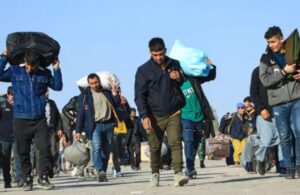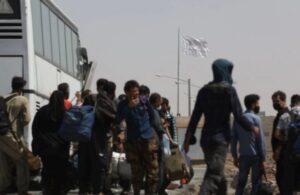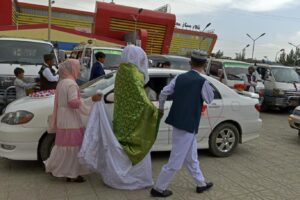KABUL (SW) – After the recent political developments in the country and the establishment of the caretaker government of the Islamic Emirate, one of the sectors that was severely damaged was the media. To the extent that in the past two years, a large number of journalists and media employees are unemployed, more than half of the media houses have stopped working for various reasons, and hundreds of experienced journalists have also left the country.
According to the report of the Afghanistan Free Media Support Organization (NAI), more than 50% of television channels, 48% of radio channels, more than 60% of news agencies and nearly 80% of online media have stopped their activities in the country.
Nasir Keshavarz, the reporter of Salam Watandar, had a special interview with Hayatullah Mohajer Farahi, the deputy of publishing affairs of the Ministry of Information and Culture, about the activities of the Ministry in relation to the media, the text of which is given below.
Question: As a first question, what is the Islamic Emirate’s definition of freedom of expression?
Answer: Our views and opinions about freedom of speech are different from the West, America and Europe from the point of view of Islam. Absolute freedom of expression is in conflict with our culture, beliefs and customs from the West’s point of view. In the religion of Islam, every person has the right to express opinion, even a person has the right to present opinion in front of the government leader. However, the freedom of speech in which religious values are not taken into account and people’s opinions are insulted or someone’s privacy is harmed, that freedom does not exist in the religion of Islam. Therefore, every person in this country has the right to freedom of expression, whatever action is allowed by Islam.
Question: What is your perception of the current freedom of expression in Afghanistan?
Answer: Our society is an Afghan and Islamic society and it has its own principles and laws, and we are obliged to observe the principles of religion and what we have been told in Islam, in all matters of life, not only in the area of freedom of speech.
Question: But the policy of the Islamic Emirate in the last two years has been based on restrictions, why?
Answer: This is not a limitation, I do not consider the implementation of Sharia and Islamic laws as a limitation in any way, we have set only three conditions for the media, Islamic values, national interests and Afghan culture and customs, considering these three items, the media and all the administrations can continue their activities.
Question: Are these three things that you mentioned defined?
Answer: I don’t think there is any ambiguity in these three cases. Islam is our religion and the limits and rules that Islam has set for us, as a Muslim, it is our duty to understand what things Islam has imposed on us and what things it has prohibited us from. Whether he is a journalist or not, if he is an ordinary person, he should know these issues, and if he does not know, it is obligatory to go to a religious scholar. Likewise, as an Afghan, as a resident of this land, we must consider the country’s national interests.
Question: Journalists complain that after the rule of the Islamic Emirate, the right to access information is limited, there is no access to information, and freedom of expression is also limited, and they cannot write critical reports about the functions of the government. What is the Islamic Emirate’s red line regarding media and journalists?
Answer: In the beginning, there were a series of problems, there was no proper understanding and coordination. All our departments have spokespersons, in this case any media and any reporter who has a problem can refer to the Ministry of Information and Culture so that they can solve the problems. We have told the media many times that there are no other restrictions except the three I mentioned earlier. They have the right to criticize for reforms, but some criticism is to destroy the system. No country will allow anyone to try to destroy the system, and the Islamic Emirate will not allow anyone to destroy the current security and the system. But in order to correct and do things right, every person in this country has the right to present his opinion.
Question: The issue of positive criticism is not clear, and there are no specific laws and policies for the media to act on. In your opinion, how much legal vacuum is felt for media work?
Answer: Currently, the same laws as before are implemented, without the three things I mentioned, I don’t have any problems in this section, because we have had several meetings with the media, and the method, situation and policy are clear and obvious to them, if there is still such a case. have, they can refer to this ministry and we are ready to cooperate in all sectors.
Question: How many journalists are currently in prison in the Islamic Emirate?
Answer: Currently, there is no criminal in our country whose crime is being a journalist, there were only three people. They were not classified because of their activities as journalists, but they had legal disputes. But in the whole country, we don’t have individual classification whose crime is journalism and working in the media.
Question: One of the basic problems faced by the media is that when an error is reported by a media, intelligence and security agencies appear in the media houses before the media-related bodies take action. Don’t you think this calls into question the performance of the security institutions and the Ministry of Information and Culture?
Answer: As I said before, no department has the right to interfere in the affairs of the media, except in security matters. If there are cases that are for the sake of security, the security forces have the right to intervene. In addition to journalistic issues, a number of journalists also carry out other activities, in which case the security forces have the right to intervene.
Question: Some media officials also complain that they were summoned to the intelligence agency and were told that you cannot publish these things. What is this?
Answer: I have already said that other departments do not have the right to interfere in media and journalism affairs. I have no information in this regard, if the matter is related to the media, they can refer to the Ministry of Information and Culture.
Question: Why is there a kind of discrimination between government and non-government media in the information sector?
Answer: We do not see any discrimination.
Question: We see that the information is accessed by the state media before it is available to the private media.
Answer: It depends on their activity, there is no obstacle in front of you. You can come anytime and get your information. The fact that a media has a lot of activity and receives information earlier is a separate issue.
Question: Most of the journalists who work in the provinces complain that the local authorities, such as the security command, Amr Be Maruf, and Intelligence, somehow interfere in the work of journalists. How much coordination is there between you and other institutions to stop them from interfering in the affairs of the media?
Answer: We have a Media Violation Commission in the center that investigates this matter, there are branches of this commission in all provinces. If there is such a problem in the provinces, journalists can go there and solve their problems, or they can go to the Ministry of Information and Culture in Kabul, or they can share their problems with us, we will definitely take care of it.
Question: One aspect of the problems is related to the government spokespersons, whether in the center or in the provinces, how accountable do you consider the government spokespersons to the media?
Answer: All spokespersons of the center and provinces are obliged to inform all the media on time because access to information is the media’s right. I repeat once again, if they have a complaint about any speech, they can refer to the Ministry of Information and Culture.
Question: In the reports that were published on the day of access to information, a number of speakers were accused of not being willing to respond to the media, such as the Ministry of Education, the Ministry of Finance, the Ministry of Foreign Affairs, the Ministry of Education and the Ministry of Defense. Have you talked to the spokespersons of these ministries regarding this issue?
Answer: We shared the matters that the media shared with us at the same time with the spokesperson of the same department, but I emphasize once again that if this happens again, the media can inform us.
Question: If the problem of a government institution is submitted to the Media Violation Commission, will there not be a problem for the journalist or the media?
Answer: No one can deny the existence of problems, as a system that has been in power for about two years, it is natural that there are problems in other sectors, there are also problems in the field of information, but the Ministry of Information and Culture promises and is committed to These problems are solved, and the media can refer to this ministry if they have problems in any department.
Question: After the return to power of the Islamic Emirate, a large number of journalists who lost their jobs were women. Should these female journalists wait for a new decree to impose restrictions on their work or continue their work with motivation and hope?
Answer: I already said that our interaction with people is based on Islamic values, national interests and our customs.
Question: Does this mean that women who work in the media should not wait for other restrictions to be imposed and continue their work safely?
Answer: One of the issues is the ruling of Islam, whether a person works in the media or walks in the market. It is a natural issue, we have not imposed certain rules on a person, what they call a limitation, we do not see it as a limitation, we as Muslims consider it our duty to do.
Question: Not long ago, a plan was proposed by the Ministry of Information and Culture to support the failing media, and you seem to be helping to prevent any media from failing. So far, how many media have been used for financial aid?
Answer: You know that now our system has not reached the point where we can provide financial aid, but we have met with many departments in the finance sectors. Also, the Ministry of Information and Culture is planning to create a financial fund, in which the system and some charitable organizations and businessmen participate, and in this way, financial assistance will be made with the media.
Question: How important is the presence of the media in a society?
Answer: No one can deny the importance of media in the 21st century. The media is the third pillar, the media is the bridge between the people and the government. Media informs people about their duties and creates ties between tribes and people. It is the media that invite people to national unity. Media has played a very important role in changing people’s thoughts.
Question: Does the government consider itself obligated not to interfere in the work of the media?
Answer: We do not interfere in the affairs of the media, of course, every system and government has rules and principles. As a government system, we consider ourselves obliged to create principles and rules.
Question: As a last question, when will the media have clear rules to continue their activities?
Answer: As you are aware, last Eid al-Adha, Amir al-Mu’minin announced in the Eidgah mosque that all institutions and laws are under review. Based on those laws, a committee has been formed, of which I was a member, and we have sent our laws to the leadership for approval.
ENDS






